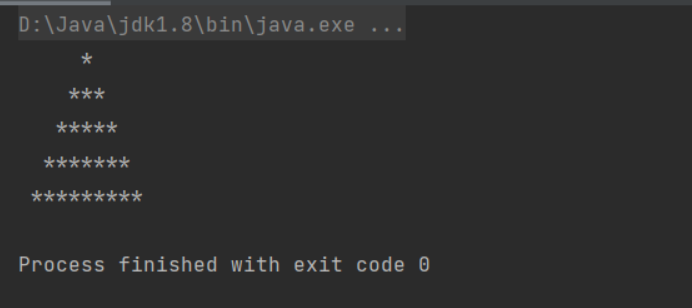java process control
Scanner
Get the input string through the next() and nextLine() methods of the Scanner class. Before reading, you generally need to use hasNext() and hasNextLine() to judge whether there is still input data
Basic syntax:
Scanner s=new Scanner(System.in);
- next():
- Be sure to read valid characters before you end the input
- next() cannot enter a string with a space (ending with a space)
public class Dome1 {
public static void main(String[] args) {
Scanner scanner = new Scanner(System.in); //Create a scanner object to receive keyboard data
System.out.println("Please enter a string:");
if (scanner.hasNext()){ //Judge whether the user has entered a string
String str= scanner.next(); //Using the next mode, the program will wait for the user to input
System.out.println("The input content is:"+str);
}
scanner.close(); //All classes belonging to the IO stream will always occupy resources if they are not closed. Make a good habit of closing them when they are used up
}
}
- nextLine():
- End with Enter
- Can get blank
public class Dome2 {
public static void main(String[] args) {
Scanner scanner = new Scanner(System.in);
System.out.println("Please enter a string");
if (scanner.hasNextLine()){
String str= scanner.nextLine() ;
System.out.println("The output string is:"+str);
}
scanner.close();
}
}
It can be simplified to:
public class Dome2 {
public static void main(String[] args) {
Scanner scanner = new Scanner(System.in);
System.out.println("Please enter a string");
String str= scanner.nextLine() ;
System.out.println("The output string is:"+str);
scanner.close();
}
}
Common nextLine()
Little practice
- Enter multiple numbers, find the sum and average. If you don't enter a number, press enter to confirm. End the input and output the execution result by entering and leaving non numbers
import java.util.Scanner;
public class Dome4 {
public static void main(String[] args) {
int sum=0; //Definitions and variables
int m=0; //Calculate the number of numbers entered
int a=0; //Define the number entered
Scanner scanner = new Scanner(System.in);
System.out.println("Please enter multiple numbers. Press enter for each number");
while (scanner.hasNextInt()){
a= scanner.nextInt();
m=m+1; //m++
sum=sum+a;
}
System.out.println(m+"The sum of the two numbers is:"+sum);
System.out.println(m+"The average of the numbers is:"+(sum/m));
scanner.close();
}
}
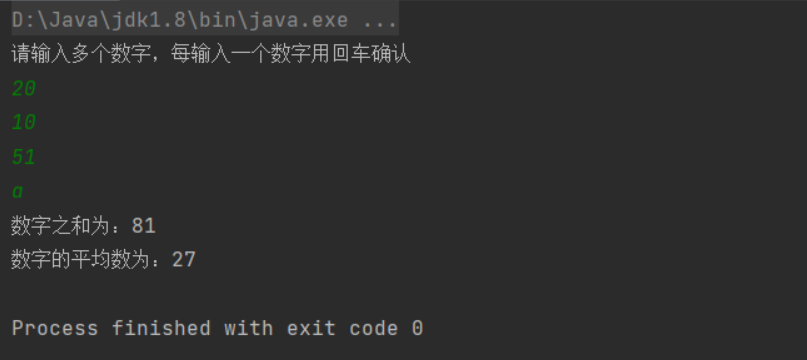
Sequential structure
Run from top to bottom
Select structure
if single selection structure
Syntax:
if(Boolean expression){
//The statement that will be executed if the Boolean expression is true
}
if double selection structure
Syntax:
if (Boolean expression) {
//The statement that will be executed if the Boolean expression is true
} else {
//The statement that will be executed if the Boolean expression is false
}
if multiple selection structure
Syntax:
if (Boolean expression 1) {
//Statement to execute if Boolean expression 1 is true
} else if (Boolean expression 2){
//Statement to execute if Boolean expression 2 is true
}else if (Boolean expression 3){
//Statement to execute if Boolean expression 3 is true
}else{
//The statement that will be executed if the above Boolean expressions are false
}
Nested if structure
Syntax:
if (Boolean expression 1){
//Statement to execute if Boolean expression 1 is true
if (Boolean expression 2) {
//Statement to execute if Boolean expression 2 is true
}
}
switch multiple selection structure
The switch case statement determines whether a variable is equal to a value in a series of values. Each value is called a branch.
The variable types in the switch statement can be:
- byte, short, int or char
- Support String type
- The case tag must be a string constant or literal
Syntax:
switch (expression){
case value:
//sentence
break; //Optional. It can be executed without adding, but penetration will occur
case value:
//sentence
break; //Optional. It can be executed without adding, but penetration will occur
//You can have any number of case statements
default: //Optional
//sentence
}
Puncture phenomenon:
char garde='2';
switch (garde){
case '1':
System.out.println("greater than");
case '2':
System.out.println("be equal to");
case '3':
System.out.println("less than");
default:
System.out.println("unknown");
}
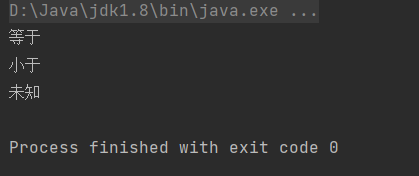
char garde='2';
switch (garde){
case '1':
System.out.println("greater than");
break;
case '2':
System.out.println("be equal to");
break;
case '3':
System.out.println("less than");
break;
default:
System.out.println("unknown");
}

When the corresponding value is matched, all statements before break will be output
Difference between if statement and switch statement
The if statement determines that the matching is an interval
The switch statement determines that a value matches
Cyclic structure
while Loop
Syntax:
while (Boolean expression){
//Cyclic content
}
do... while loop
At least once
Syntax:
do{
//Cyclic content
}while (Boolean expression);
The difference between while and do... While
while judge before execute, do... while execute before Judge
for loop
It is a general structure supporting iteration and the most effective and flexible loop structure
Syntax:
for (initialization; Boolean expression; to update){
//Cyclic content
}
for(; ; ){ //Dead cycle structure
}
Little practice
- Output the sum of odd and even numbers within 100 respectively
public class While {
public static void main(String[] args) {
int sum=0;
int sum1=0;
for (int i=0;i<=100;i=i+2){
sum+=i;
}
for (int a=1;a<=100;a=a+2){
sum1+=a;
}
System.out.println("100 The sum of even numbers within is"+sum);
System.out.println("100 The sum of odd numbers within is"+sum1);
}
}
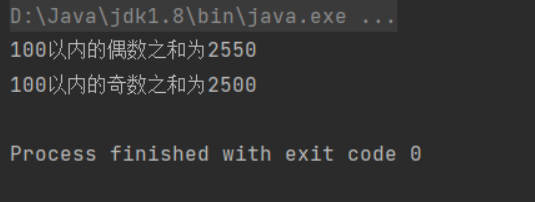
- Output the number that can be divided by 5 within 1 ~ 1000, and output 3 per line
public class While {
public static void main(String[] args) {
int sum=0;
int sum1=0;
for (int i=1;i<=1000;i++){
if (i%5==0){
System.out.print(i+"\t");
}
if (i%5*3==0){
System.out.println();
}
}
}
}
println will wrap after output
No line break after print output
- Output 99 multiplication table
public class While {
public static void main(String[] args) {
for (int i = 1; i <= 9; i++) {
for (int i1 = 1; i1 <= i; i1++) {
System.out.print(i1 + "*" + i + "=" + i1 * i + "\t");
}
System.out.println();
}
}
}
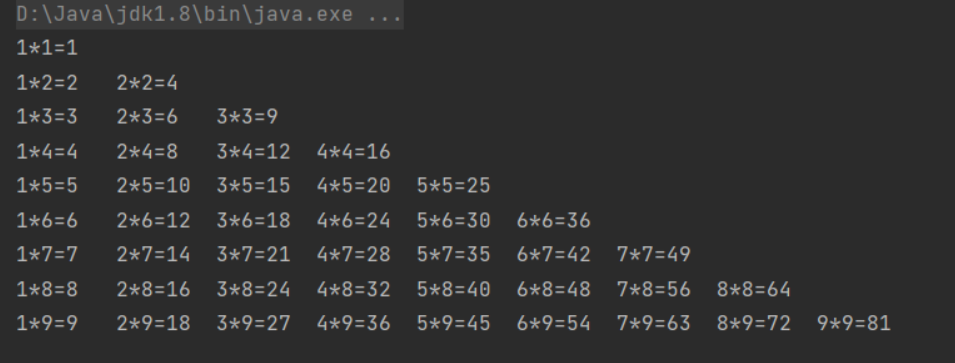
Steps:
- Print first column
- Wrap the fixed 1 in a loop
- Remove duplicates
- Adjust style
Enhanced for loop
Syntax:
for (Declaration statement:expression){
//Cyclic content
}
break continue
The main part of any loop can be terminated with break to forcibly exit the whole loop, but the program will not be terminated
continue is used to terminate a loop
practice
- Drawing triangles exercise
public class Break {
public static void main(String[] args) {
for (int i = 1; i <=5; i++) {
for (int j=5; j >=i; j--) {
System.out.print(" ");
}
for (int j=2; j <=i; j++) {
System.out.print("*");
}
for (int j=2; j <=i; j++) {
System.out.print("*");
}
System.out.println("*");
}
}
}
